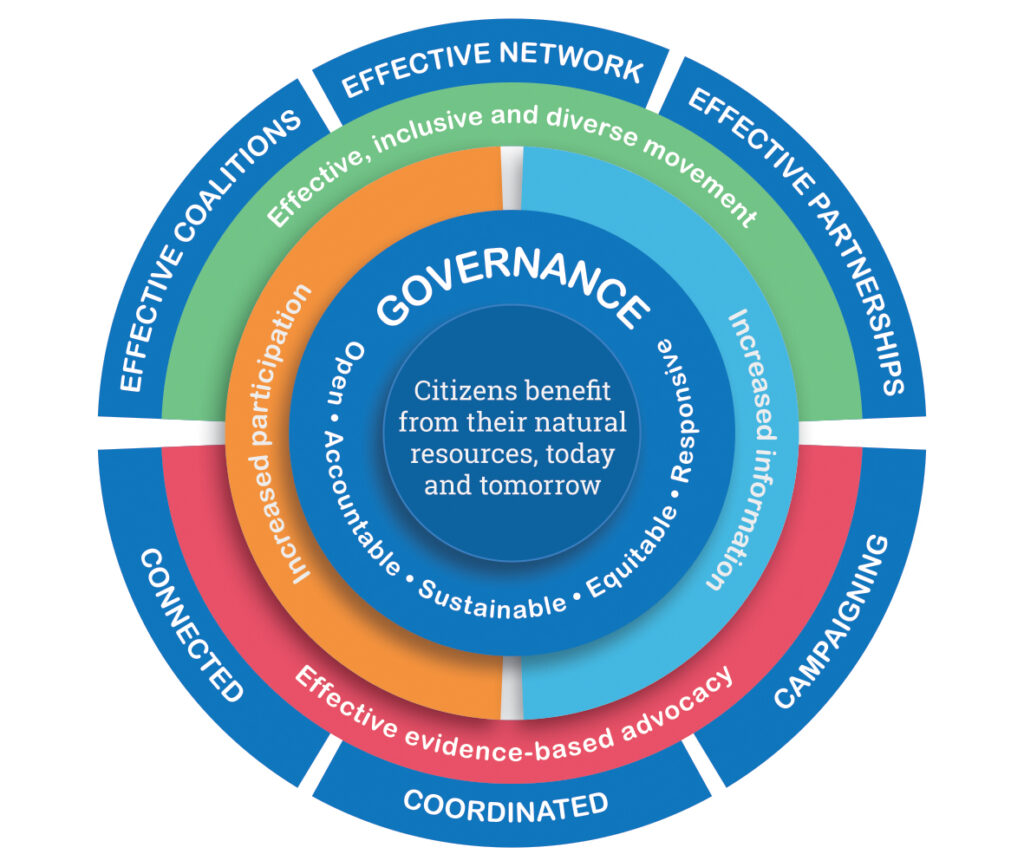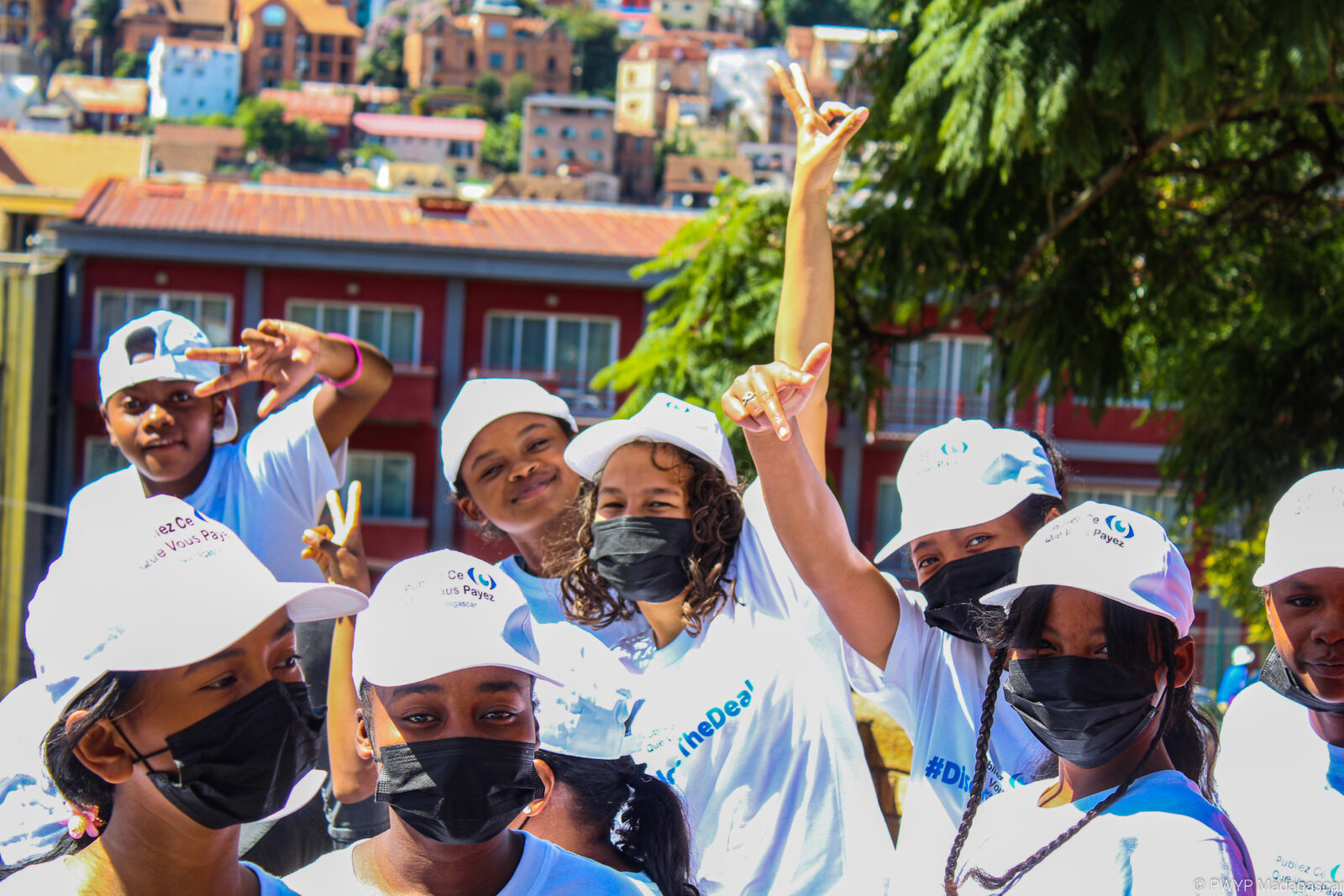The Global Council, which took office in June, will be leading the PWYP global movement in the final two years of implementation of our global strategy, Vision 2025; and into the development of our next strategic phase from 2025 onwards.
2022 marks the mid-point of the strategy implementation period. To understand progress, challenges and lessons which can inform the remainder of the strategy implementation, a mid-term review of progress by the global movement has been commissioned. The review is particularly important given the disruptions and challenges presented by the COVID-19 pandemic, which struck just as our strategy began in 2020.
Good progress on our global goals
It is not possible to cover every aspect of the work of all 51 PWYP national coalitions. The review therefore focused on five thematic priorities: contract disclosure, use of data, civic space, gender equality and the energy transition. It also provides an overall assessment of progress towards our four global goals: to be informed, influential, heard and connected. The review is grounded in extensive document review as well as seven regional focus group discussions (with 55 members) and interviews with a total of 34 informants.
The review finds that we are making good progress on our goals to be informed, heard and connected; and some progress on our goal to be influential.
- Informed: The PWYP network has led extensive work on securing the disclosure of contracts, beneficial ownership, and social and environmental information. For example, important changes have been achieved in national laws and policy, as well as international norms, in relation to contract disclosure. PWYP’s contribution is likely to have been significant, including via the global #DiscloseTheDeal campaign.
- Influential: PWYP has made good progress but influence on policy is not necessarily aligned with the assumptions of the strategy – that policy change is driven by using information. Problem-driven analysis generates more focused advocacy asks and seems to get more traction with duty bearers. There are examples of PWYP’s policy impact that are not rooted in the generation of analytical evidence. In these instances, strength of advocacy and/or the reputation that PWYP members have developed were key to success. PWYP should think about whether its definition of influential adequately captures the diversity of the influencing that is actually happening across the movement.
- Heard: There is evidence that the movement is becoming more confident and active in tackling civic space issues. PWYP members have also been active in defending and widening participation in natural resource governance at the national level – for instance pushing back against efforts to reduce civil society representation in national EITI multi stakeholder groups. Efforts to diversify coalition membership have resulted in the inclusion of more women, youths and other minority groups, with evidence of synergies built between the agendas of these groups and the work led by PWYP.
- Connected: PWYP coalitions are on the whole stronger, more diverse and inclusive. There has been a strong focus on diversifying coalitions and encouraging cross country learning, coordination and solidarity. PWYP is increasingly working across movements, with strong cross-sectoral partnerships and alliances with the tax justice, human rights and gender justice movements. Major work has taken place to position PWYP on climate justice and energy transition issues and there are some strong emerging partnerships with climate organisations as a result of this work.
Key recommendations and next steps
The review highlights key recommendations for PWYP. These include the need to strengthen strategic focus on securing a just energy transition to a low carbon economy by accelerating internal debates and strategic engagement in fossil fuel and transition mineral producing countries to arrive at clear advocacy goals. On civic space, PWYP should work to anchor its advocacy in shared standards for more globally consistent and effective impact. It is recommended that PWYP build on successful efforts by continuing to campaign for contract transparency through the #DiscloseTheDeal campaign. PWYP should also draw on the principles of the global gender policy to inform their efforts towards becoming a movement that promotes gender justice and embraces and applies feminist values, principles and practices. Finally, the review recommends that PWYP considers the use of data analysis in its advocacy approaches including exploring partnerships with experts/institutions to facilitate that analysis.
These findings are intended for PWYP coalitions to inform their national level plans, as well as for the Secretariat which will be developing its 2023-2024 Operational Plan in the coming weeks. The Secretariat will continue to structure its contribution towards the implementation of Vision 2025 around six functions: effective coalitions, effective networks, effective partnerships, connected advocacy, coordinated advocacy and campaigning.

The 2023-2024 outcomes and indicators for each function will be developed in light of the mid-strategy review’s recommendations. We expect to see a continued focus on contract disclosure and on advancing our efforts towards making our advocacy and campaigning work gender transformative. When it comes to civic space, we will be reviewing efforts and building lessons learned, recognising that partnerships will continue to be critical. The more significant change in emphasis will be in relation to the energy transition, where PWYP has an important role to play in established and emerging fossil fuel producer countries, as well as those countries which are rich in minerals that are critical for a low carbon economy.
Onwards!
The context in which we do our work is becoming increasingly complex, with the ongoing economic and social effects of the pandemic, the war in Ukraine and the climate crisis all having a significant impact on our ability to deliver on our mission. PWYP coalitions’ continued dedication and their engagement with the findings of this review to inform future plans will be crucial to effect positive change for people in resource rich countries.
Note:
The full mid-strategy review report is available in English and French on request.
A webinar will be organised at the end of November to provide an opportunity for the Secretariat to share the key elements of its 2023-2024 Operational Plan as well as to provide a space for members to reflect on the findings of the mid-strategy review.











